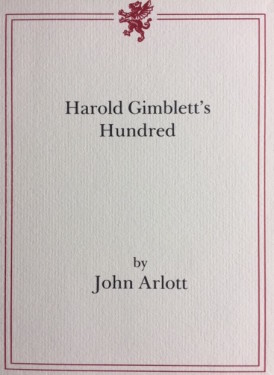The Publications of Richard Walsh
Martin Chandler |
Back in 1991 West Country journalist Richard Walsh published a poem, written by John Arlott, about a famous century that Somerset opener Harold Gimblett scored on debut in 1935. There were 135 copies of the poem, 110 of them in card covers, numbered and signed by Arlott (who was to pass away later that year). The remaining 25 are case bound and additionally signed by five survivors of that famous game, played at Frome, against Essex.
Suitably encouraged by the reaction to the Gimblett project Walsh published a further 13 limited editions throughout the 1990s. They began, as befitted a man from the West Country, on the theme of county cricket in that idyllic part of England, although in due course the scope of the books expanded to cover a wider choice of subjects.
Walsh himself wrote several of the books, and his first was one of the longer essays in the series. It told the story of a County Championship match between Kent and Worcestershire in 1960, which runs to 20 pages and was published in 1995. Like the Arlott/Gimblett offering All Over in a Day appeared in two versions. The total limitation was 150, the case bound version again bearing signatures of those involved. I am not sure how many case bound copies there are, but mine is numbered 44, so I suspect it must be 50. In 1995 Walsh also penned a 24 page essay on the captain of Kent in that remarkable match, Colin Cowdrey, which appeared the same year.
The name of Alan Gibson is not revered in the way that those of Arlott, Cardus and Robertson-Glasgow are, probably as a result of the bulk of his work appearing in newspapers and magazines rather than in book form. But his writing loses nothing in comparison with such giants of cricket literature, and in 1992 Walsh published short essays by Gibson on former Gloucestershire left arm spinner Sam Cook, and the county’s left arm seamer from the 1960s and 1970s, Jack Davey.
Gibson is also credited with an essay on Dennis Silk that appeared in 1993. Silk was best known as an administrator, but was also a stylish amateur batsman for Cambridge and Sussex in the 1950s. Gibson died four years later and when he wrote for Walsh was already effectively retired as a result of the heavy toll that depression and alcoholism had taken on him. None of the Walsh published essays stand comparison with the writing from Gibson’s halcyon days, but all have their moments.
Another renowned West Country writer, David Foot, was showcased by Walsh in 1993, in an essay written about Mark Lathwell and Andy Caddick, who both made their Test debut in that summer’s Ashes series. It was the one piece of writing about contemporary players that appeared.
An early offering, in 1991, was a monograph by former Gloucestershire wicketkeeper Andy Wilson on the subject of the teammate who despised Walter Hammond, Charles Barnett. Later, in 1996, Wilson added a short essay entitled Gloucestershire Wicketkeepers. The previous year former Gloucester player, and author of a history of the county, Grahame Parker, had added to Walsh’s list 8 pages on The Graveneys.
The last of the “local” books, and at 19 pages the longest of them, West Country Umpires, appeared in 1996. Like all save the Gimblett poem and All Over in a Day it appeared in a case bound limited edition of 50 and was co-written by Peter Eeles and Sam Cook. The latter sadly died before the book appeared, so it is signed by just one of the authors.
In 1997 the only unsigned book appeared, a reprinted piece by Arlott on the subject of Wilf Wooller, effectively by way of an obituary of the man who for so long had been Glamorgan cricket personified. Of the remaining two in the set the last to appear, in 1998, was another reprinted pen portrait, this time by Tony Lewis of Trevor Bailey. The best of the lot had come in 1996, and was the irrepressible Frank Keating at the very top of his game, on the subject of a true national treasure, Denis Compton, who was to depart this mortal coil the following year.
Through the 1990s and early 2000s there was a long hiatus in my collecting habit, so I didn’t hear about any of the Walsh publications when they were new, thus I had to pick them off one by one from dealers and at auction. I never stopped to wonder why the steady flow of titles had stopped in 1998 and just assumed that Walsh had retired, or that his cricket watching by then took place on the Elysian Fields.
So it came as a bit of shock to me to see a book appear on eBay in 2014 that looked at first glance to have the mark of Richard Walsh on it. A closer inspection revealed that it was indeed a Walsh. My initial reaction was that I had somehow missed one along the way, but much to my surprise it transpired that this was in fact the first new book from the House of Walsh in 16 years. My order followed without delay.
Roy Booth – Last of the Centurions is the title. Who was Booth is the first question. The answer to that one is that like Jack Davey and Sam Cook he was one of the game’s unsung heroes. Hailing from Yorkshire Booth spent a few seasons with the county of his birth as a wicketkeeper in the early 1950s. He failed to grasp the job as first choice for himself after an extended opportunity in 1954 and then served as understudy to Don Brennan and, latterly, to Jimmy Binks. Eventually he signed for Worcestershire and spent the rest of his career with that county, in 1960 becoming just the seventh ‘keeper to snare 100 victims for a season, a feat he repeated in 1964 when Worcester won the first of back to back Championships.
Over just a dozen pages Walsh provides a succinct summary of the career of Booth, then 87 years of age, as well as introducing some of his subject’s own memories of a happy life in the game. Booth was a week shy of his ninety second birthday when he died in 2018. The book appeared in a numbered limited edition of fifty, all signed by author and subject.
And what of Richard Walsh? I am delighted to be able to report that the man himself is alive and well, still living in Somerset and he remains a practising journalist of the freelance variety. His musings can be found on twitter by following @Richardscoop1. He tells me has no current plans to publish anything more, but certainly doesn’t rule out doing so in the future. I for one sincerely hope that he does.






Leave a comment